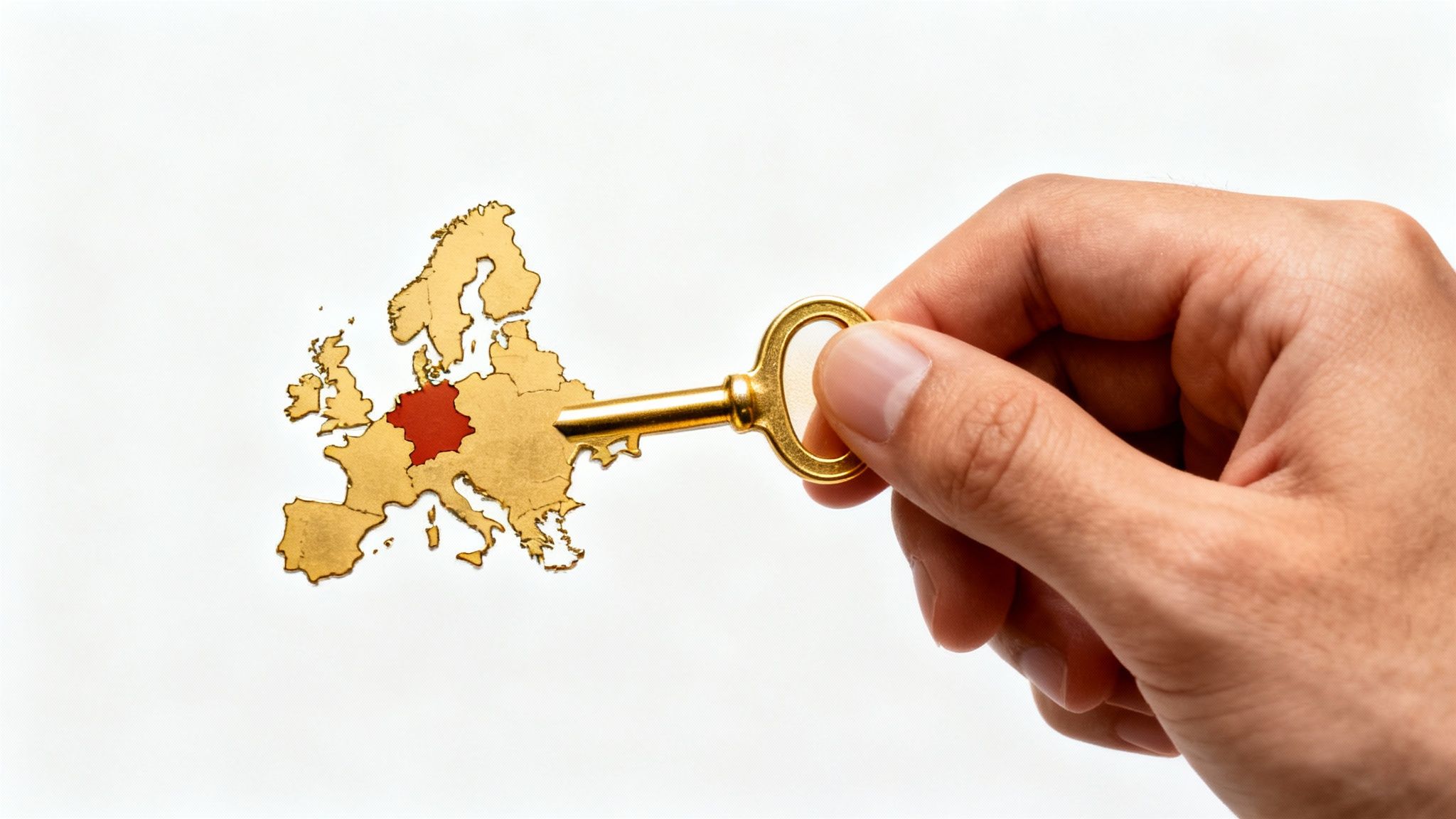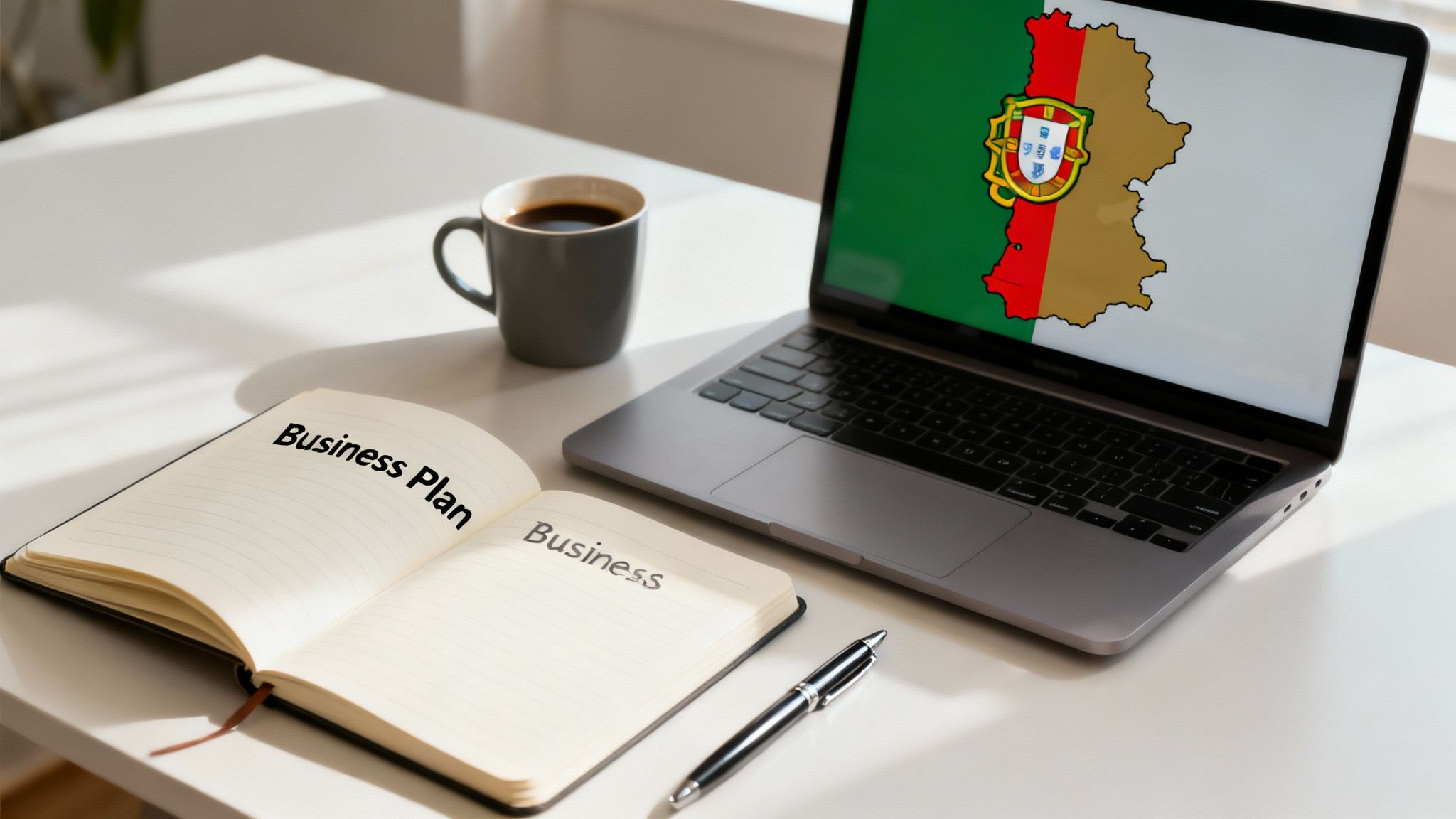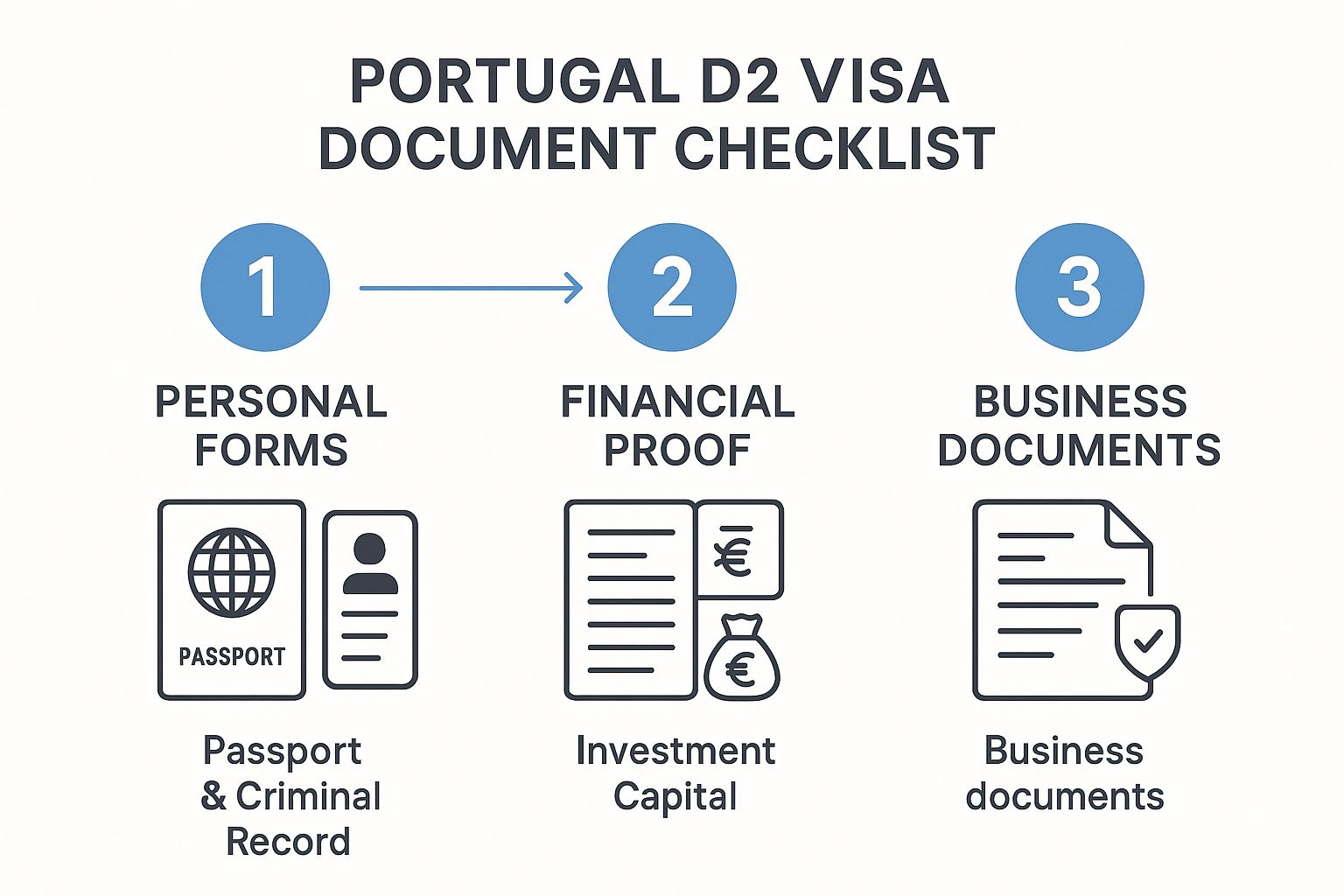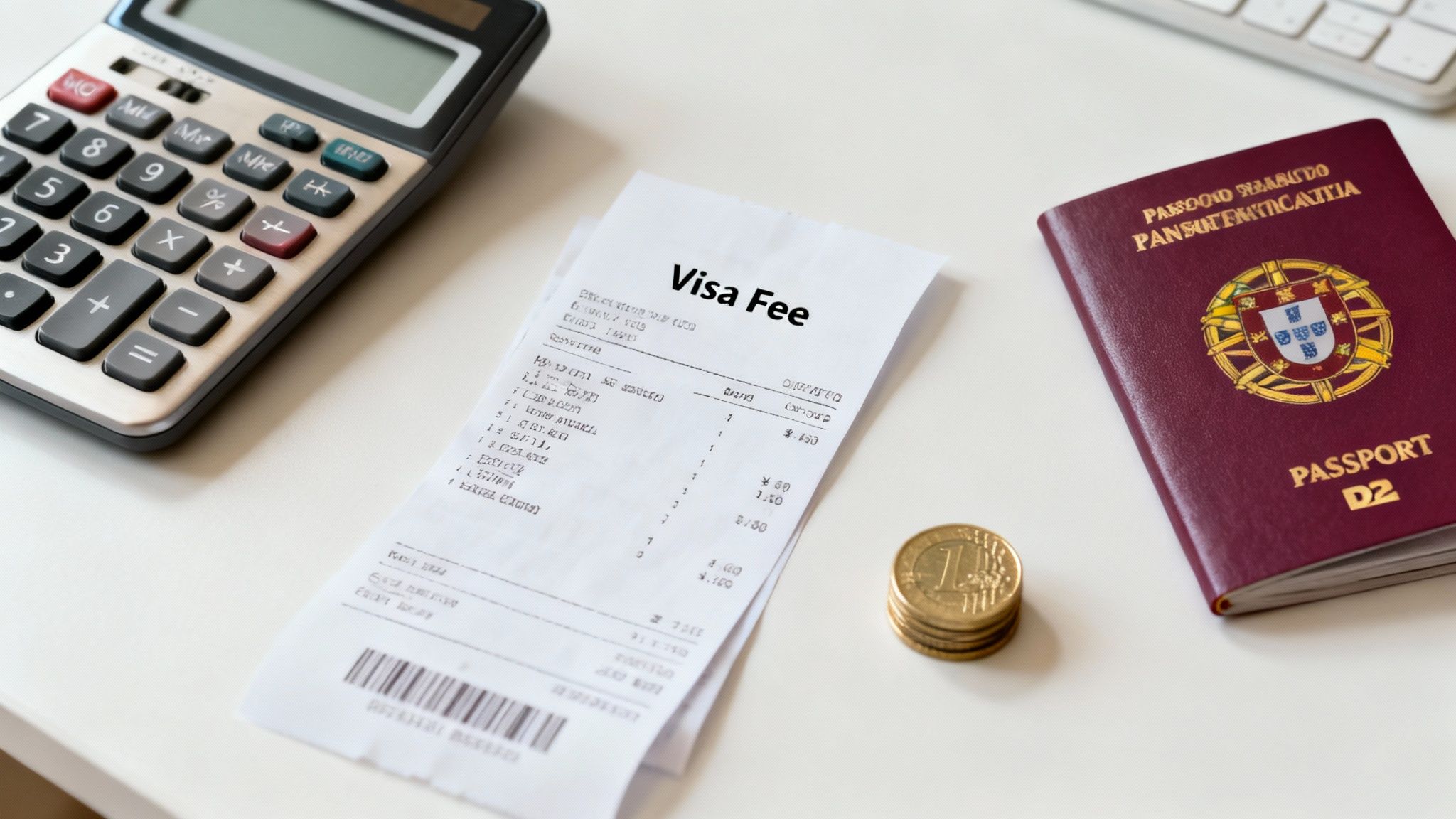The Portugal D2 visa is essentially a residency path built for entrepreneurs from outside the EU. It's designed for anyone looking to start a new business, open a branch of their existing company, or invest in and run a Portuguese business.
To qualify for the D2 visa, the core requirements boil down to two key things: a rock-solid business plan that proves your venture is viable and showing you have enough money to support yourself in Portugal.
Unlocking Portugal Through Entrepreneurship

Think of the D2 visa as the "founder's key" to Europe. It’s specifically for active business owners who are ready to roll up their sleeves and contribute to the Portuguese economy. This isn’t for passive income earners or remote employees—it's your direct route to residency through genuine entrepreneurship.
The whole idea behind the D2 is to attract business-savvy people who can create real value. Portuguese authorities aren't just looking for an idea on a napkin; they want to see a tangible project with a real shot at success.
Here's a quick overview of what the D2 visa entails.
| Portugal D2 Visa At a Glance |
|---|
| Requirement Category |
| Brief Description |
| Key Takeaway |
| Applicant Type |
| Non-EU/EEA/Swiss citizens planning to establish or manage a business in Portugal. |
| You must be an active entrepreneur, not a passive investor. |
| Core Requirement |
| A comprehensive and viable business plan showing the project's relevance and potential. |
| Your business plan is the single most critical document in your application. |
| Financial Proof |
| Demonstrate sufficient personal funds to live in Portugal, plus capital for the business. |
| You need to prove you can support yourself and fund your business idea. |
| Business Structure |
| Can be a new startup, a branch of an existing foreign company, or taking over a Portuguese business. |
| The visa is flexible, but you must be actively involved in operations. |
| Outcome |
| Grants a 4-month visa to enter Portugal, followed by a 2-year residency permit, renewable for 3 years, leading to permanent residency. |
| It’s a clear and direct path to long-term residency and eventual citizenship. |
This table simplifies the main components, but the real work lies in proving your entrepreneurial commitment.
Who Is the D2 Visa For?
This visa is a fantastic fit for a few specific types of ambitious people from outside the EU. You're a strong candidate if you are a:
- Startup Founder with a fresh idea and a detailed plan to get it off the ground in Portugal.
- Small Business Owner wanting to expand into the European market by opening a local branch.
- Freelancer or Independent Contractor who can show a consistent client base and operates under a formal business structure.
- Investor who isn't just buying shares but plans to acquire and actively run an existing Portuguese company.
The bottom line is proving your active involvement in a business venture inside Portugal. Unlike other residency paths, the D2 demands a clear entrepreneurial drive and a plan that shows your business will have a positive economic, social, or technological impact.
While the D2 is a great route for many, it's not the only game in town for innovators. If your idea is heavily tech-focused, it's worth comparing your options. You can learn more about the differences in our guide to the Portugal Startup Visa.
Ultimately, your success hinges on one thing: proving you have a credible business vision and the financial stability to make it happen. This guide will break down every single requirement to help you build an application that gets approved.
Meeting the Core Eligibility Requirements
Before you even start drafting that brilliant business plan, you need to clear a few fundamental hurdles. Think of these as the gatekeepers to your D2 visa application. If you don't meet these personal requirements, the most innovative business idea in the world won't be enough to get you approved.
First things first: your citizenship. The Portugal D2 visa is specifically designed for entrepreneurs and investors who are not citizens of the European Union (EU), European Economic Area (EEA), or Switzerland.
If you hold a passport from one of these regions, good news—you already have the right to live and work in Portugal. You don't need this visa. This rule ensures the D2 program does what it's meant to do: attract talent and investment from outside the European single market.
Proving Financial Stability
Beyond your passport, Portuguese authorities need to know you can support yourself when you land. This is a non-negotiable step known as proving your "means of subsistence." It's their way of making sure you won't become a financial burden on the state while your business is getting off the ground.
The magic number here is tied directly to Portugal's national minimum wage. For 2024, that figure is €820 per month.
So, as a single applicant, you must prove you have at least €9,840 (which is €820 x 12 months) sitting in a Portuguese bank account. This isn't just a suggestion; it's a hard requirement.
Things change a bit if you’re bringing family along. The amount you need to show increases with each person you add to your residency application.
- For your spouse or partner: Add 50% of the main applicant's annual amount (€4,920).
- For each dependent child: Add 30% of the main applicant's annual amount (€2,952).
Let's make that real. A family of four (two adults, two children) would need to show a combined total of €19,680. That breaks down to €9,840 (for you) + €4,920 (for your spouse) + €2,952 (for child one) + €2,952 (for child two). This must be proven with an official statement from a bank in Portugal.
Maintaining a Clean Criminal Record
Finally, you'll need to demonstrate a clean criminal record. This is a standard security check, and you’ll need to provide an official criminal record certificate from two sources: your country of origin, and any other country where you’ve lived for more than one year since you were 16.
Make sure this document is recent—it typically must be issued within the last 90 days. Depending on your home country, you might also need to get it apostilled or officially translated into Portuguese.
Nailing these three core requirements—citizenship, financial proof, and a clean record—is the first major milestone on your path to a successful D2 visa. Once you have these locked down, you can move on to the heart of your application: the business itself.
How to Craft a Winning Business Plan
 Let’s be direct: your business plan is the single most important document in your D2 visa application. It’s not just paperwork; it's the entire story you're telling the Portuguese authorities about your vision. A generic, copy-paste plan is one of the fastest ways to get rejected.
Let’s be direct: your business plan is the single most important document in your D2 visa application. It’s not just paperwork; it's the entire story you're telling the Portuguese authorities about your vision. A generic, copy-paste plan is one of the fastest ways to get rejected.
Think of it this way: you wouldn't ask a bank for a construction loan without a detailed blueprint. Portugal is making an investment in you, and they need to see a clear, well-researched, and convincing plan for how your business will succeed in their country.
Demonstrating Value to Portugal
Your plan has to do more than just describe what your business does. It needs to answer the one question every immigration officer is thinking: "Why should we approve this business in our country?"
You need to clearly show how your venture adds value. The most convincing applications always highlight at least one of these contributions:
- Economic Impact: Will you hire local staff? Will you use Portuguese suppliers or bring in foreign investment?
- Social Impact: Does your business fill a gap in a local community? Does it support sustainability or add to the local culture?
- Technological or Innovative Relevance: Are you introducing new technology, a unique service, or a fresh approach to an old industry?
For example, a plan for yet another generic coffee shop will likely fall flat. But a specialty coffee shop that sources its beans from Portuguese roasters, hires local baristas, and hosts community events? That’s a much more compelling story.
Core Components of an AIMA-Approved Plan
To build that convincing case, your business plan needs several key sections. Each one builds on the last to paint a complete and credible picture of your venture.
Here's what you absolutely must include:
- Executive Summary: This is your one-page elevator pitch. It needs to grab the reader’s attention immediately and summarize your mission, product, target market, and key financial numbers.
- Company Description: Get into the specifics. What exactly does your business do, what problem does it solve for customers, and what is its legal structure (e.g., sole trader or LDA)?
- Market Analysis: This is where you prove you’ve done your homework. Who are your direct competitors in Portugal? Who is your ideal customer? Show the market size and any relevant local trends.
- Marketing and Sales Strategy: Okay, you've analyzed the market—now how will you actually get customers? Detail your plans for pricing, advertising, and sales channels within Portugal.
- Financial Projections: This part is critical and non-negotiable. You must provide a realistic three-to-five-year financial forecast, including profit and loss, cash flow, and a balance sheet. Your numbers can't be pulled from thin air; they must be backed by solid assumptions from your market research.
The key is to connect all the dots. Your market analysis should directly inform your sales strategy, and that strategy must support your financial projections. It all needs to flow together as a single, logical document that gives officials confidence in your ability to succeed. This is a vital part of the Portugal D2 visa requirements.
Your Complete D2 Visa Document Checklist
Putting together your document package for the Portugal D2 visa feels a bit like packing for a major expedition—every single item is critical. Forget one piece of paper, and your entire journey can grind to a halt. This checklist breaks everything down into simple, manageable categories so nothing slips through the cracks.
A perfectly organized application is your best bet for a fast timeline. The D2 visa process typically takes between 60 to 90 days, but that can easily double if your paperwork is a mess. Getting it right the first time is the only strategy that matters.
This infographic gives you a bird's-eye view of the main document groups you'll need to pull together.

As you can see, your application stands on three pillars: personal, financial, and business documents. Each one is absolutely essential for getting that approval stamp.
Essential Personal and Legal Forms
This first batch of documents is all about proving who you are and that you’re in good legal standing. Think of them as the concrete foundation of your application. Every detail must be accurate, current, and formatted exactly as the Portuguese consulate expects.
Here’s what you’ll need to have in hand:
- Completed National Visa Application Form: This is the official kickoff for your entire application.
- Valid Passport: Make sure it’s valid for at least six months beyond the date you plan to be in Portugal.
- Two Recent Passport-Sized Photos: These aren't just any photos; they must meet the specific Schengen visa photo requirements.
- Criminal Record Certificate: This needs to be fresh—issued within the last 90 days—from your home country and any other country where you’ve lived for more than a year. It usually needs an apostille to be considered valid.
- Proof of Health Insurance: You’ll need a policy with a minimum coverage of €30,000 that’s valid across the entire Schengen area.
Proving Your Financial and Business Readiness
Okay, now it's time to talk money and vision. This is where you show the Portuguese authorities that you have the financial muscle to support yourself and that your business isn't just a dream on a napkin.
- Proof of Financial Subsistence: You must have a Portuguese bank account with statements showing you hold at least the annual equivalent of the Portuguese minimum wage.
- Detailed Business Plan: As we’ve mentioned, this is the heart of your D2 application. It needs to lay out your goals, market analysis, and solid financial projections.
- Company Formation Documents: If you’ve already registered your company in Portugal, you’ll include the incorporation and registration paperwork here.
- Proof of Investment Capital: This is a statement from a Portuguese bank confirming you have the funds ready to launch and run the business as described in your plan.
Your financial documents need to tell a single, coherent story. The money in your personal account proves you can live comfortably, while the funds in your business account must perfectly match the investment capital you outlined in your business plan.
Securing Your Portuguese Base
Last but not least, you have to prove you have a place to live in Portugal. This shows the authorities you’re serious about moving and have already made tangible arrangements.
You'll also need a Portuguese tax identification number, known as a NIF. It's non-negotiable for almost every transaction in the country. To get a handle on this crucial step, check out our guide on how to get your NIF number in Portugal.
For your proof of accommodation, any one of the following will work:
- A 12-month rental lease agreement (known in Portuguese as a contrato de arrendamento).
- A property deed if you've already bought a home in Portugal.
- A letter of invitation from a resident if you’re planning to stay with someone for a short time while you get settled.
Navigating the D2 Visa Application Process
Think of the Portugal D2 visa application as a journey with two major milestones. First, you get the D2 visa from your home country—that's your ticket to enter Portugal. Second, once you've arrived, you'll attend an in-person meeting to get your official residence permit, which is what lets you legally stay and work.
Your journey kicks off at the Portuguese consulate or embassy in your country of citizenship or legal residence. This is where you'll submit the whole package: your business plan, proof of funds, and all the personal forms. Consider this your first pitch; officials here will do an initial check to make sure you've met all the portugal d2 visa requirements and that your plan is solid.
The AIMA Appointment in Portugal
Once your initial application is approved, you'll get a four-month temporary visa stamped in your passport. This is your window to travel to Portugal and tackle the final, most important step: your residency appointment with AIMA (the agency that took over from SEF). This isn't optional—your visa is just the key that unlocks this final meeting.
This in-person appointment is where your temporary visa gets converted into a two-year residence card. You’ll need to bring the original copies of many of the same documents you submitted back home, so keep everything organized and easy to grab.
Booking this meeting can be a real headache due to high demand. For some expert tips on locking in your spot without the stress, you can learn more about how to book VFS Portugal visa appointments fast and avoid common delays.
Understanding the Timeline
So, how long does this all take? From the day you hand in your application at the consulate, you should expect a decision within 60 to 90 days. This is just an average, of course, and a few things can speed it up or slow it down.
- Application Quality: A complete, well-organized application with a convincing business plan will always move through the system faster.
- Consulate Workload: Some consulates are just busier than others. Processing times can vary a lot depending on where you apply.
- Time of Year: Trying to apply during peak seasons, like summer, can sometimes mean slightly longer waits.
Being meticulous with your paperwork is the single best thing you can do to land on the faster end of that timeline. A single missing document or a small inconsistency can push your application to the bottom of the pile, adding weeks or even months to your wait. A little planning now will make for a much smoother move to Portugal later.
Budgeting for All D2 Visa Costs and Fees

When you're planning for the D2 visa, it's easy to focus all your attention on the big number—your business investment capital. But a successful application hinges just as much on a realistic budget for the visa process itself. Thinking about these costs upfront saves you from last-minute stress and ensures there are no surprises down the line.
Too many applicants get tripped up by only planning for the main visa fee. They completely overlook the smaller, yet mandatory, expenses that can quickly snowball. A solid financial plan accounts for every single step, from the initial application fee to the residence permit appointment in Portugal and all the administrative hurdles in between.
Breaking Down the Core Application Costs
Let's start with the most straightforward expenses: the official government fees. These are non-negotiable and paid directly to the Portuguese consulate or its partner, like VFS Global. It's crucial to check the latest figures before you apply, as they can and do change.
For instance, as of early 2025, the National D visa fee recently increased from €90 to €110 per applicant. On top of that, most people will pay a VFS service fee of around €40. You can find more details on these updated Portugal visa fees on Jobbatical.com.
Accounting for Ancillary Expenses
Here’s where many budgets fall apart: the ancillary costs. These are the supporting expenses needed to get your documents in perfect order. They are just as critical as the official fees—if you miss any of them, your application could be rejected flat out.
These are the key "hidden" costs you need to factor in:
- Document Preparation: This is often the biggest surprise expense. Getting official documents like your criminal record check translated, notarized, and apostilled by certified services can easily run upwards of €1,000.
- Mandatory Health Insurance: You cannot apply without a valid travel health insurance policy that meets Schengen requirements. A compliant policy will typically set you back about €400 per person.
By planning for all these figures—the official fees plus the essential ancillary costs—you create a financial safety net. A well-thought-out budget is the foundation of a strong D2 visa application, clearing the path to Portugal by removing any nasty financial surprises.
Your D2 Visa Questions Answered
Navigating the details of any visa always brings up a few specific questions. Let’s tackle some of the most common uncertainties we hear from entrepreneurs looking at the Portugal D2 visa, so you can get a clearer picture of your next steps.
Can I Bring My Family on a D2 Visa?
Yes, absolutely. The D2 visa was designed with families in mind, and it includes a straightforward family reunification process. Once your residency permit is approved, you can officially bring your spouse, dependent children, and even dependent parents to live with you in Portugal.
This is one of the biggest advantages of the D2 route. The visa has an exceptionally high success rate—around 99.4%—making it a reliable path not just for your business, but for your entire family’s future. After five years of residency, your family also becomes eligible for permanent residency and even citizenship. You can dig deeper into the D2 visa success rates and family benefits at Global Citizen Solutions.
D2 Visa vs. Digital Nomad Visa: What Is the Difference?
This is a critical distinction that trips up a lot of people. The D2 visa is for entrepreneurs who are actively building a business inside Portugal. You're setting up shop locally, hiring, and contributing to the Portuguese economy. The Digital Nomad (D8) visa, on the other hand, is for remote workers or freelancers whose clients and business are entirely outside of Portugal.
Think of it this way: The D2 visa is for building a business in Portugal. The D8 visa is for bringing your foreign remote job to Portugal.
Is There a Minimum Investment Amount?
Officially, no. The Portugal D2 visa requirements don't list a specific investment figure you have to meet. However, your business plan is the star of the show here. It must prove that you have enough capital to get the business off the ground and keep it running until it becomes profitable.
While there isn't a magic number, a well-funded plan shows the authorities you’re serious and have the means to succeed. It inspires confidence.
Trying to piece all these requirements together can feel overwhelming, but you don't have to do it alone. GetFastVisa specializes in managing the entire D2 visa process, from getting your documents perfect to securing that crucial AIMA appointment. We make sure your application isn't just complete—it's compelling. Let our experts guide your entrepreneurial journey to Portugal at https://www.getfastvisa.com.
Article created using Outrank
Related Resources
Tags

Guilherme Lima
Founder & CEO
Guilherme is the founder and CEO of GetFastVisa, a serial entrepreneur who previously co-founded two Fintechs recognized by the Central Bank of Portugal for his initiatives. Through his company and team, he has helped hundreds of applicants navigate the Portuguese visa application process by streamlining visa services and appointment booking, making Portugal relocation more accessible for digital nomads and entrepreneurs worldwide. Please note: Guilherme is not an attorney and does not provide legal advice.

